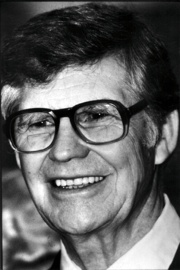Canadian Origins
Angus Cowan (1914 – 1986)

Angus Cowan played a pivotal role in introducing the Bahá’í Faith to Canada’s aboriginal peoples. He shared the teachings of Bahá’u’lláh while traveling in Western Canada, and later served as a member of the Continental Board of Counsellors for the Americas, an advisory board that assists national communities in their development.
Angus Cowan was born on 12 September 1914 in Bishopton, Quebec. He attended high school in Knowlton, and then studied at McGill University’s Macdonald Campus in Sainte-Anne-de-Bellevue.
He took an active interest in sports, serving as captain of his hockey and baseball teams, and was at various times a member of the Big Brothers Association, president of the John Howard Society, and the representative from Saskatchewan on the national committee of the Canadian Corrections Association.
In 1946, Cowan returned to university, working in a bookstore to earn a little money. He recounted, “A customer by the name of John Robarts came in twice while I was on duty. I became his babysitter. I met his daughter, Nina, aged about four, who taught me my first Bahá’í lesson. John and Audrey Robarts became friends to me and had lots of patience for three years. Then Bobbie [Mr. Cowan’s wife] and I were ready to turn to Bahá’u’lláh. The happy day was 30 March 1949.”
Between 1953 and 1967, Angus Cowan served on the National Spiritual Assembly of the Bahá’ís of Canada, the national governing council.
The following six years were described by Cowan as the most exciting period of his Bahá’í life. During those years he steadfastly shared the teachings of the Bahá’í Faith with the indigenous peoples. The deep love he had had for them all his life began to manifest itself in 1958 in the aboriginal communities of Saskatchewan. He came to be so loved and respected by the aboriginal peoples of Canada and the United States that the Tlingit people adopted him into the Eagle band and bestowed upon him the name Yik-Gah (Great-Great-Grandfather).
His enthusiasm to serve the Bahá’í Faith sometimes led him to make hasty decisions. At an international conference in 1968, after listening to a plea for Bahá’ís to travel to share the teachings of the Faith, he was so inspired that he pledged to go to Venezuela, and only on his way home did the sobering thought occur to him that he had not consulted with his family! He did not act on that offer, and the burden of guilt weighed on him for some years until it was good-naturedly dispelled by Bahá’í friends. He enjoyed sharing this story as an illustration of the need to balance audacity of initiative with realistic expectations of ourselves and our loved ones.
In October 1976, Angus Cowan was appointed to the Continental Board of Counsellors. He served in this capacity for the next decade. Cowan exemplified Bahá’u’lláh’s exhortation to be “generous in prosperity and thankful in adversity.” At the last major conference he attended, he told his friends that he was thankful for all the tests he had been given, even for the cancer that had invaded his body. He went on to say that he had often spoken over the years of reliance on God, but it was only through the pain and suffering he was then enduring that he felt he had come to a clearer understanding of what that phrase meant. He passed away on 9 March 1986.
* Adapted from Bahá’í World, Vol. 19, 1983–1986, “In Memoriam,” pp. 703–6.
Early Canadian Bahá’ís
The Bahá’í community has a rich history of members who have contributed greatly to their society as well as to the early development of the Bahá’í community in Canada and the world.